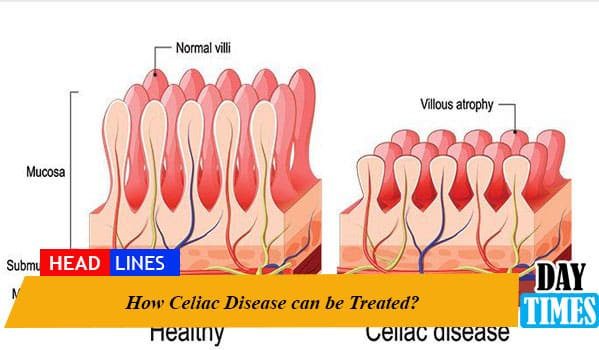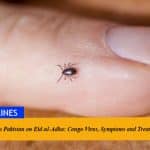Your small intestine suffers from the digestive issue known as celiac disease. It prevents your body from absorbing nutrients from food. If you have celiac disease and consume gluten-containing foods, your body will react abnormally. Wheat, rye, barley, and oats all contain a type of protein known as gluten.
The immune system, which is a component of your body that fights disease, begins to hurt your small intestine. It targets the minuscule bumps (villi) that line your small intestine. Your body’s villi aid in nutrient absorption into your bloodstream. No matter how much food you eat, your small intestine cannot get enough nutrients without the villi. But in this disease, your body’s ability to absorb nutrients gets harmed.
This is why we are going to discuss the treatment of this disease along with its symptoms, causes, and prevention to be taken at home in this situation.
About Celiac Disease
Gluten, a protein present in wheat, barley, and rye, causes celiac disease, also known as celiac sprue or gluten-sensitive enteropathy, which is an immune response to consuming it.
Eating gluten sets off an immune reaction in your small intestine if you have celiac disease. This reaction wears down the lining of your small intestine over time and prevents some nutrients from being absorbed (malabsorption).
Intestinal damage frequently results in diarrhea, exhaustion, weight loss, bloating, and anemia and can have serious consequences. In addition to causing the symptoms seen in adults, malabsorption in children can affect growth and development.
Although there is no known treatment for celiac disease, most people find that adhering to a strict gluten-free diet can help manage their symptoms and encourage intestinal healing.
What are the Symptoms of Celiac Disease?
People are affected by celiac disease in various ways. Some people begin to experience symptoms when they are too young. Others only experience symptoms as adults.
Each person’s symptoms may vary. Common signs of celiac disease include:
- Constipation or constant (chronic) diarrhea
- Gas
- Pale, foul-smelling stool
- Tiredness due to unexplained low blood count (anemia)
- Leg tingling or numbness
- Missed menstrual periods (linked to too much weight loss)
- Early osteoporosis or fractures
- Infertility
- Tooth enamel loss or color changes
Some typical signs of pain include:
- Consistently reoccurring stomach pain
- Bloating
- Muscle or bone pain
- Joint pain
- A painful, itchy skin rash
Children with celiac disease may not develop normally in terms of growth. You may have celiac disease but not have any symptoms.
That is because the part of your small intestine that is not hurt can still take in enough nutrients. But you may still be at risk for problems of the disease. You should consult a gastro doctor right now to get an effective treatment.
What causes Celiac Disease?
An inherited condition, celiac disease runs in families. You might not even be aware that you have celiac disease because you don’t experience any symptoms.
The following are a few things that could cause symptoms to emerge:
- Pregnancy
- A lot of stress
- Childbirth
- A surgery
- A physical injury
- An infection
How is Celiac Disease diagnosed?
Your healthcare provider will examine you physically and review your past medical history to determine if you have celiac disease.
Additionally, you might undergo tests like:
1- Blood work
- This test measures the quantity of infection-fighting cells (antibodies) to gluten that is present in your blood.
- These cells are present in greater quantities than usual in people with celiac disease.
- Antibodies are produced by your immune system to aid in the fight against things that the body perceives as threats, such as gluten.
2- Biopsy
- This is the most reliable method of determining whether you have celiac disease.
- Your small intestine is biopsied to obtain a tissue sample in order to look for villi damage.
- An endoscope, a long, thin tube, is inserted into your mouth, down to your stomach, and into your small intestine to accomplish this.
- Tools are used to cut a tissue sample and a lab examines the sample.
What is the Treatment for Celiac Disease?
You have to give up gluten if you have celiac disease. Your small intestine will suffer more harm if you consume gluten. This condition can only be treated by avoiding gluten. For the rest of your life, you must not consume gluten.
Eliminating gluten from your diet will typically stop your symptoms. In addition, your intestine will start to heal from any damage. Likewise, it will prevent further harm from occurring.
Getting rid of gluten from your diet can be challenging. This is because many foods can become contaminated by gluten. It can be discovered in unlikely places, such as salads and sauces. Because of this, your doctor might suggest that you consult a dietitian who specializes in celiac disease.
Your symptoms will probably improve within a few days after you stop consuming gluten-containing foods. In 3 to 6 months, your small intestine should fully recover. Your villi will be going to function yet again. Your body may need up to two years to heal if you are older.
How can you care for yourself at home?
- Eliminate gluten from your diet to avoid symptoms and small intestine damage.
- For a while, you might have to stay away from milk and dairy products. The intestine will start to heal once you stop consuming gluten. Later on, consuming milk and dairy products may be acceptable once your intestine has healed.
- Look for hidden gluten on food labels, such as in some food additives and some medications, by carefully reading the labels. When “modified food starch” appears on a label, gluten may be present in the product.
- Finding ways to cope with celiac disease may be easier if you join a support group. For information on local support groups, speak with your doctor, the hospital where you live, or a dietitian.
Consult a Gastroenterologist To get Effective Treatment
The small intestine is damaged by celiac disease. The body has a difficult time absorbing vitamins and other nutrients as a result. Celiac disease cannot be avoided.
A strict gluten-free diet, however, can stop and even reverse the damage to the small intestine. Moreover, we would suggest you book an appointment with the best gastroenterologist in Lahore to get an effective treatment plan for this situation.


























































